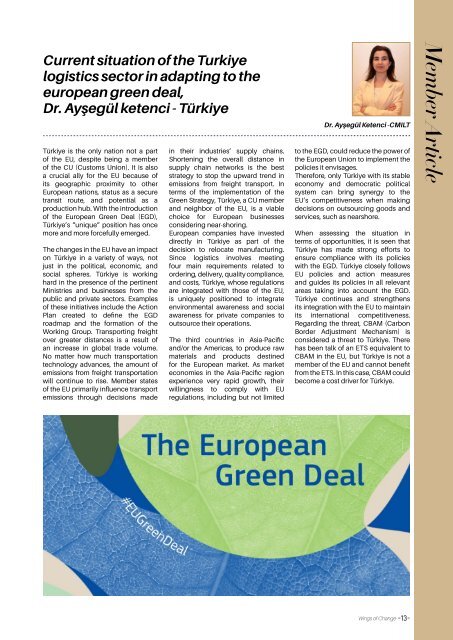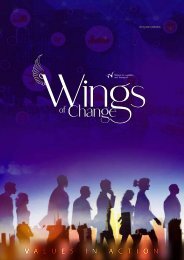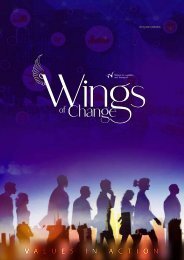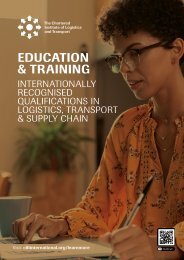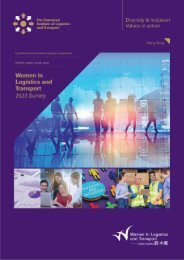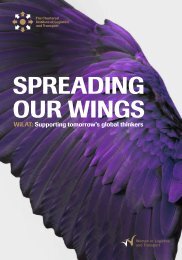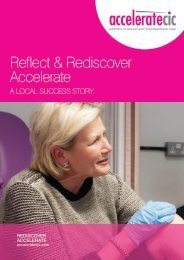Wings of Change Newsletter January 2024
The 10th edition of the newsletter from WiLAT
The 10th edition of the newsletter from WiLAT
You also want an ePaper? Increase the reach of your titles
YUMPU automatically turns print PDFs into web optimized ePapers that Google loves.
Current situation <strong>of</strong> the Turkiye<br />
logistics sector in adapting to the<br />
european green deal,<br />
Dr. Ayşegül ketenci - Türkiye<br />
Türkiye is the only nation not a part<br />
<strong>of</strong> the EU, despite being a member<br />
<strong>of</strong> the CU (Customs Union). It is also<br />
a crucial ally for the EU because <strong>of</strong><br />
its geographic proximity to other<br />
European nations, status as a secure<br />
transit route, and potential as a<br />
production hub. With the introduction<br />
<strong>of</strong> the European Green Deal (EGD),<br />
Türkiye’s “unique” position has once<br />
more and more forcefully emerged.<br />
The changes in the EU have an impact<br />
on Türkiye in a variety <strong>of</strong> ways, not<br />
just in the political, economic, and<br />
social spheres. Türkiye is working<br />
hard in the presence <strong>of</strong> the pertinent<br />
Ministries and businesses from the<br />
public and private sectors. Examples<br />
<strong>of</strong> these initiatives include the Action<br />
Plan created to define the EGD<br />
roadmap and the formation <strong>of</strong> the<br />
Working Group. Transporting freight<br />
over greater distances is a result <strong>of</strong><br />
an increase in global trade volume.<br />
No matter how much transportation<br />
technology advances, the amount <strong>of</strong><br />
emissions from freight transportation<br />
will continue to rise. Member states<br />
<strong>of</strong> the EU primarily influence transport<br />
emissions through decisions made<br />
in their industries’ supply chains.<br />
Shortening the overall distance in<br />
supply chain networks is the best<br />
strategy to stop the upward trend in<br />
emissions from freight transport. In<br />
terms <strong>of</strong> the implementation <strong>of</strong> the<br />
Green Strategy, Türkiye, a CU member<br />
and neighbor <strong>of</strong> the EU, is a viable<br />
choice for European businesses<br />
considering near-shoring.<br />
European companies have invested<br />
directly in Türkiye as part <strong>of</strong> the<br />
decision to relocate manufacturing.<br />
Since logistics involves meeting<br />
four main requirements related to<br />
ordering, delivery, quality compliance,<br />
and costs, Türkiye, whose regulations<br />
are integrated with those <strong>of</strong> the EU,<br />
is uniquely positioned to integrate<br />
environmental awareness and social<br />
awareness for private companies to<br />
outsource their operations.<br />
The third countries in Asia-Pacific<br />
and/or the Americas, to produce raw<br />
materials and products destined<br />
for the European market. As market<br />
economies in the Asia-Pacific region<br />
experience very rapid growth, their<br />
willingness to comply with EU<br />
regulations, including but not limited<br />
Dr. Ayşegül Ketenci -CMILT<br />
to the EGD, could reduce the power <strong>of</strong><br />
the European Union to implement the<br />
policies it envisages.<br />
Therefore, only Türkiye with its stable<br />
economy and democratic political<br />
system can bring synergy to the<br />
EU’s competitiveness when making<br />
decisions on outsourcing goods and<br />
services, such as nearshore.<br />
When assessing the situation in<br />
terms <strong>of</strong> opportunities, it is seen that<br />
Türkiye has made strong efforts to<br />
ensure compliance with its policies<br />
with the EGD. Türkiye closely follows<br />
EU policies and action measures<br />
and guides its policies in all relevant<br />
areas taking into account the EGD.<br />
Türkiye continues and strengthens<br />
its integration with the EU to maintain<br />
its international competitiveness.<br />
Regarding the threat, CBAM (Carbon<br />
Border Adjustment Mechanism) is<br />
considered a threat to Türkiye. There<br />
has been talk <strong>of</strong> an ETS equivalent to<br />
CBAM in the EU, but Türkiye is not a<br />
member <strong>of</strong> the EU and cannot benefit<br />
from the ETS. In this case, CBAM could<br />
become a cost driver for Türkiye.<br />
Member Article<br />
<strong>Wings</strong> <strong>of</strong> <strong>Change</strong> -13-


